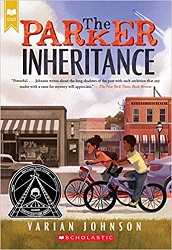
 The Parker Inheritance
The Parker InheritanceReview posted May 18, 2020.
Arthur A. Levine Books (Scholastic), 2018. 331 pages.
Starred Review
Review written in 2018 from a book sent by the publisher.
2018 Sonderbooks Stand-out:
#6 Contemporary Children's Fiction
2019 Coretta Scott King Author Honor Book
2019 Boston Globe/Horn Book Honor Book
The Parker Inheritance is a wonderful tribute to The Westing Game, with a mysterious millionaire leaving money to enhance a town in the south – if and only if someone can solve the clues and tell the story of discrimination that happened in the past.
Many years ago, Candice’s grandmother was city manager of Lambert, South Carolina. She got one of the original letters and tried to solve the clues – but succeeded only in disgracing herself by digging up some tennis courts and not finding the treasure.
Now Candice and her mother are living in her grandmother’s old home for the summer. In the attic, she finds an envelope addressed to her from her grandmother. In the envelope is the original letter – promising treasure for the town and for the person who solves the clues.
Brandon, a neighbor kid from across the street is there in the attic with her when she finds the letter. (They were looking for books to read, because her grandma was good about that, too.) Together, they start researching the people mentioned in the letter, the Washington family, who got run out of Lambert back in 1957.
The book gives periodic interludes from the story of the Washingtons while we follow the main story of Candice and Brandon solving the clues.
And Candice and Brandon have to learn about what happened in 1957. They look at pictures in the library. They need to find yearbooks from both the white high school and the colored high school. They find out about a secret tennis match between the two schools. The African Americans won, and there were repercussions.
The puzzle is well done, but the story supports it well – making this much more than just a puzzle book. I’m going to have to reread The Westing Game. It also tells a story of racism – which was sad back in 1957, but is largely overcome over the years. I especially like Siobhan Washington’s emphasis on love and forgiveness and rising above.
